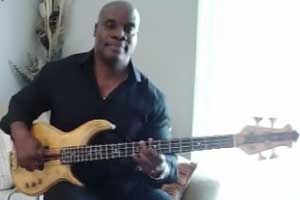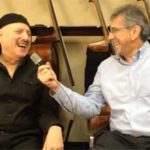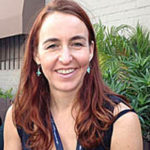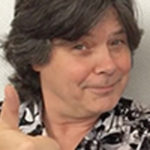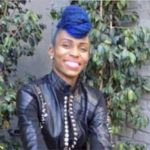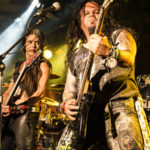First-hand accounts of the gigs with Sonny Rollins, Pharoah Sanders, Paquito D’Rivera and Chaka Khan, plus so much more! One a 2-part series with the Blake Brothers!
Exclusive interview with FBPO’s Jon Liebman
August 20, 2012
Russel Blake has been a professional musician, solo artist and educator for over three decades. He has served as Adjunct Professor of Electrical Bass Studies at five universities throughout the U.S. and has performed, toured and lectured in 65 countries, across five continents.
Blake is the creator of The Universal Language Music History & Cultural Program, which he has presented to a wide variety of audiences. He has also been contracted by the U.S. State Department to perform as an Ambassador of Goodwill in several West African nations.
As a bassist, Russel has performed, toured and/or recorded with Sonny Rollins, Pharoah Sanders, Hugh Masekela, Paquito D’Rivera, Hilton Ruiz, Chaka Khan, Wallace Roney, Hiram Bullock, Dee Dee Bridgewater, Harry Belafonte, Dave Valentin, Clark Terry, Wynton Marsalis, Melba Moore and many others.
FBPO: I know you come from a musical family. Were you born in Panama like your brother Alex, or had your family already moved to the U.S. by the time you were born?
RB: My family migrated from Panama to the States in 1959 and I was born two years later, in Brooklyn. I’m the first of the family—both sides of the family—to be born in this country.
FBPO: Tell me about your musical upbringing.
RB: On my 12th birthday, I was expecting my dad to come home with a football or a basketball. Instead, he came home with a forty-dollar bass and stated that he had a vision that both of his sons were going to play this instrument. In fact, he had already started Alex, who, by that time, was working as a professional musician. The thing that’s significant about this is that my father, a self-taught musician—he plays trombone and trumpet—never played the bass. So, for him to act on a vision where both of his sons played a different instrument than he did is very significant. He put his plan into action and began teaching me four hours a day. In three months’ time, I began working as a professional.
FBPO: That’s pretty quick!
RB: My father emphasized the details, buying the best classical books by Simandl and method books by Bob Haggart and Ray Brown. He had me studying not only out of bass books, but also out of cello books—the Bach cello suites—as well as trombone books, since both the trombone and the cello are on the same clef. So that gave me a totally different perspective on the instrument.
As soon as I came home from school, my responsibility was to go to the porch, open up those books and start all of my studies that he had outlined for me before he went to work in the morning. He enlisted the aid of my mom to make sure I would follow his instructions to the letter and study that bass four hours a day.
FBPO: Was this strictly upright bass?
RB: No. As a matter of fact, it was electric. I started out on the electric. Alex started out on the Ampeg baby bass. I started learning the bass in May of ’73 on a forty-dollar Teisco bass and my first job was the following September. I had a job at the Waldorf-Astoria in New York City. It was an emergency call. My dad phoned his colleagues in New York. They needed a bass player and my dad told them that I played and he brought me to the gig.
It was a big Panamanian band for an annual dance. When we both came in, they assumed he was going to play the bass. When I picked up the instrument, sat down and started warming up, a protest ensued. They were upset about the fact that this kid was going to be playing alongside them. My dad just said, “Put the chart in front of him, count the time off and let’s go.” So they mumbled, they grumbled, but they had no choice. They counted off the time, the gig started, I read everything from sight. At the beginning of the gig I had seventeen enemies and by the end of the night I had seventeen very close friends. We had a great time. And that’s the humble beginning of my career.
FBPO: That’s a great story! It’s curious that your father wanted both you and Alex to play the bass. Wouldn’t you think he’d choose a different instrument for you?
RB: He had a vision. I can’t explain it. He played the trombone and the trumpet, so this was truly significant to the acuity of his vision and how powerful and profound his vision must have been. With all of his experience in Panama working as a professional musician, he would always watch the bass players. He always taught us that the bass is the heart of the band. He would watch the bass players on the gig, look at their technique, how they play, their dynamics, etc. He used those very same memories and experiences in instructing not only Alex, but me too. He’s an incredible individual! I have to give him all the credit for my accomplishments. I can’t speak to why he would have both of us on the same instrument, only to the fact that he was being completely obedient to the vision that was given to him.
FBPO: Who were your influences as a young student of bass?
RB: My earliest influences were Ray Brown and Bob Haggart because I had been studying out of their books. Alex introduced me to the sounds of Scott LaFaro and Jimmy Blanton, too. And of course, there was Simandl. I can’t forget the great classical bassist Simandl! These were my influences. I tried to focus on the upright bass players because I always abided by the philosophy that you cannot master the tree without knowing the roots of that tree. Eventually, I started studying Jimmy Garrison, Charlie Mingus, all of the greats from the days of old. Paul Chambers, of course, Percy Heath… Alex was a tremendous influence, as well.
On the electric bass, my influences covered a wide range. During the ’70s, there were a great many bass players who were having a tremendous influence on the sound of our culture. Among the rock players who influenced me were Noel Redding and Billy Cox with Jimi Hendrix and John Entwistle with the Who. I was also into the funk bands like the Ohio Players, Parliament Funkadelic, etc. I just had a wide range of influences during that time.
FBPO: When did your career really start to take off?
RB: Actually, it was when I was 17. After working all that time, I was presented with an opportunity to go on tour with South African jazz trumpeter Hugh Masekela. That’s when things really took off for me. I began doing some Broadway shows, then I got the call from CBS one day to come in and be the bassist with this saxophone player, who had actually just defected from Cuba. He was with a great Cuban group called Irakere and his name was Paquito D’Rivera. As a result of the political leverage that they had, he was given a deal with CBS Records.
So he called me in and it was Eddie Gomez and me on bass. As a matter of fact, on that initial album, Eddie and I played together on one particular cut called “Basstronaut.” We did the album and it was a fantastic experience. We got to do a week at Seventh Avenue South, a premier jazz club at the time. From there, I got the gig with Chaka Khan and we did about six months all over the United States. Then from Chaka, it just continued to spiral onto a great number of artists with whom I’ve had the opportunity to work, most significantly Sonny Rollins.
FBPO: Tell me about Sonny.
My tenure with Sonny included multiple tours to Japan and Europe and all across the United States. There was one year that he chose just to play all the universities. He did no touring internationally. He just chose to play universities throughout the United States. That was an incredible experience! Jon Faddis and Wynton Marsalis also joined us on a couple of those tours. It was an incredible education to work with Sonny and to continue to still have his ear to this day.
FBPO: How would you describe your “Melodius Chordal” technique?
RB: I had always tried to develop my own voice. Everybody today is so busy trying to sound like somebody else. The philosophy of the “Melodius Chordal” technique states that the four-string electric bass is a lead instrument—not unlike the piano or six-string guitar—in terms of melody, harmony and rhythmic accompaniment, performed simultaneously. I made a commitment to develop this technique and I would study nine hours a day.
To this day I currently have 432 pieces in my repertoire, ranging from Mozart, Beethoven, Tchaikovsky, Rachmaninoff, Segovia and Bizet all the way to jazz, with Ellington and Basie and all the great composers in jazz music. I’ve also got some R&B pieces from Stevie Wonder, as well as Billy Joel, just to show a wide-ranging repertoire, to show the capabilities of the instrument.
The five-string is a great instrument; the six-string is a great instrument. I came up in the era of the four. I do play the five professionally when I have to do certain gigs, but my life is the four-string because that’s what I’m in love with. It also gives the technique a broader significance, doing these pieces on a four-string. When you do it on a four, with just ten fingers and four strings, no special effects, no overdubs, it has to be accepted, natural and organic potency. Hey, there it is; there you have it.
FBPO: When you say solo, you mean unaccompanied?
RB: Correct. That’s how I’ve been basically supporting myself for the last five to seven years, ever since I sort of stopped working as a sideman.
FBPO: Tell me about that part of your career.
RB: My last gig as a sideman, I was working as the bassist for Brenda Russell. I was also working with Cybill Shepherd, the actress, at the same time. With Brenda, I did a tour in Japan and with Cybill, I did a tour in Europe. By that point in time, though, I had garnered enough experience after working and touring with people like Sonny Rollins and Harry Belafonte and doing the Lion King and Chaka Khan, Angie Stone, Mary Mary, George Coleman… Just a wide range of people with whom I’ve worked with in multiple genres of the industry.
I decided I needed to evolve. I did not want to simply continue being a sideman bassist. It’s an honorable profession, but when you’re given a gift to do something a little bit bigger, you have to respond to that gift. So I’ve been primarily working as a soloist for the last five to seven years.
FBPO: What is The Universal Language Music History & Cultural Program?
RB: I had decided some years ago that I wanted to give back, as a result of the music industry giving so much to me. I wanted to try to give back in a way that would be culturally edifying and uplifting for students, in particular, students of music. So I developed the The Universal Language Music History & Cultural Program.
Today, we find a society that’s youth-oriented, but at the same time is very one-dimensional. So much of our youth only abide and involve themselves in one form of music, whether it’s hip-hop, or whether it’s rock, or whether it’s R&B, or whether it’s pop. They are still limiting themselves in terms of not gaining exposure to other genres. I’m not sure whether it’s the result of a lack of art programs in the schools, or our society or in their homes. Each dynamic is different.
Kids are not being exposed to classical music. They’re not being exposed to traditional jazz music, especially when we look at the marketing plans and how those two genres alone are suffering economically in the landscape. Classical music stations and traditional jazz stations are becoming extinct. Kids do not have the exposure to these different forms of music, so I took it upon myself to develop a program that would expose these forms, these genres of music, to children of all ages, from kindergarten through college.
I basically expose them to the different genres of music and the main innovators in that music. In classical, I choose Mozart and Beethoven and I will play Mozart’s Eine Kleine Nachtmusik and Beethoven’s Moonlight Sonata, for example, to give them a demonstration of these particular pieces. I give them a brief bio of their lives—Mozart was born in 1756, he died in 1791, he composed over six hundred pieces of music, etc. Then I do a performance of their work. Then I move on to ragtime and introduce them to Scott Joplin and his significance to our culture. Then I move on to Caribbean music and introduce the Mighty Sparrow, etc. We’ll do a sixty-minute to seventy-five-minute program, followed by a question-and-answer period. I’ve been doing this now for much longer than I expected.
I’ve now done the program at maximum security prisons, I’ve done it at hospitals, senior centers, libraries and military installations. I’ve also performed it all over the world as a goodwill ambassador for the State department and I was also contracted by the Defense Department to perform this program for DARPA, the Defense Advanced Research Project Agency.
I had no idea when I began this program that it would touch so many different people in so many ways. There’s nothing more fulfilling or gratifying for a musician than when he can go and perform before terminally ill children who come to the performance with IVs and, you know, their hair is gone, they’re gaunt and they’re pale and skinny from all the chemo and they’re struggling and you can put a smile on their face just by performing the Sesame Street theme song. So I’m very grateful for the program. It’s a vehicle for me right now, not only to give back, but to receive.
FBPO: That’s beautiful. Tell me about some of your solo releases.
RB: I’ve created three smooth jazz CDs. The first was called Silent Power, the second was Quiet Strength. The new CD that was just completed was actually one that is pretty much a cornerstone. That one is called Fierce Solitude. It contains twenty-one tracks, featuring fifteen special guests, including Alex and my dad. It was recorded in four cities across the United States: New York, Los Angeles, Atlanta and San Diego. My dad was eighty-six years old at the time and I got him on trombone to perform on a piece. Another thing significant about Fierce Solitude is that it features eleven different genres of music, from neo-soul to salsa, to traditional jazz, to gospel. In addition to smooth jazz CDs, I have a collection called Ten Fingers & Four Strings Solo Series, Volumes 1-4, as well as a CD of classical works, called Meditations.
FBPO: It’s great that you’re collaborating not only with your brother, but with your father, too.
RB: Well, I stay close to my dad. I’m here in Los Angeles, stationed in LA, and my dad is in San Diego. Given the fact that he’s up in age, I try to meet up with him two times a month at a minimum to continue to grow on the knowledge from him. His career has been so extensive, so expansive.
As for Alex, regrettably, we have not had the opportunity to collaborate as we should. He is traveling constantly with Randy Weston, not to mention the fact that he’s based in New York and I’m based in LA. I am hopeful that at some point in the near future, Alex and I will have the opportunity to sit down and finally collaborate on a “blood brothers” project.
FBPO: Well, we would all look forward to that! How about the future, Russel? What else would you like to do that you haven’t accomplished yet?
RB: Jon, to be quite honest with you, I’m living my dream. I’m living my vision right now. The Meditations CD is out now. In addition to being a concert soloist, in addition to all that I do on the bass, I’m also a music producer. I believe in continuing to evolve in what talents we are innately given. We have to continue to magnify ourselves.
The bass will always be my anchor. It’s my center, it’s what gives me relevance and it gives me an organic core from which to fly because, were it not for the bass, nothing else in my life would’ve happened. It also helped me evolve into becoming a music producer. So in terms of doing something I haven’t done yet, I would love to transcribe the Meditation CD and have it performed live by a symphonic orchestra. That is something that I would very much like to do.
I have another upcoming project that is going to be very powerful and it should be released in the fall. I would love to tell you about it, but I think I’m going to keep it as a surprise until everything is finalized with my publishers.
FBPO: That’ll give us an excuse to talk again!
RB: Yes it will! In the meantime, though, I’m just simply trying to give as much of a comprehensive look at my career as I possibly can. It’s been a very extensive career, Jon, and I feel like it’s actually just beginning. I’ve been very blessed to have such incredible grounding in terms of my experience and I owe it all to my dad for putting that bass in my hands at such an early age. As he used to tell me, “This bass is going to take you around the world,” and he prophesied correctly. Sixty-five countries later, having played for presidents, kings, queens and ambassadors and all that stuff, he was exactly right. I’ve worked with some of the greatest piano players in Latin jazz, from Hilton Ruiz, Papo Lucca, Michel Camilo, Jorge Dalto. And a lot of great drummers, too. I also worked with Billy Cobham, Lenny White, Jack DeJohnette, Al Foster.
FBPO: Billy is from Panama also, as I’m sure you know.
RB: Yes he is. If I’m not mistaken, I think his dad and my dad actually worked together. It was very significant to find out that Billy is from Panama. His brother Wayne plays trumpet. Alex will be able to fill you in and walk you through more on his time touring with Billy throughout the seventies.
FBPO: What would you be if you were not a bass player? I mean outside of music.
RB: Oh, Jon, how dare you! Not being a bass player, what would I do?
I’m just kidding. You know, that’s a very good question, Jon. Prior to my father implementing his vision upon my life, my desire was to be an Air Force fighter pilot. That was my desire as a young child. I wanted to be a fighter pilot and/or an attorney. I was very stimulated by law, even at such a very young age. So those were my two dreams that I had intended to pursue and, lo and behold, my dad came home with that bass and put it in my hands.
There are no games about it. The bass is the heart of the band. It’s what breathes life into us as far as being a human family. Music was given to us in order to keep us in harmony with the Creator and the bass is a very significant part of that. I’m just glad to be one of the pieces of that puzzle, being a bassist.
